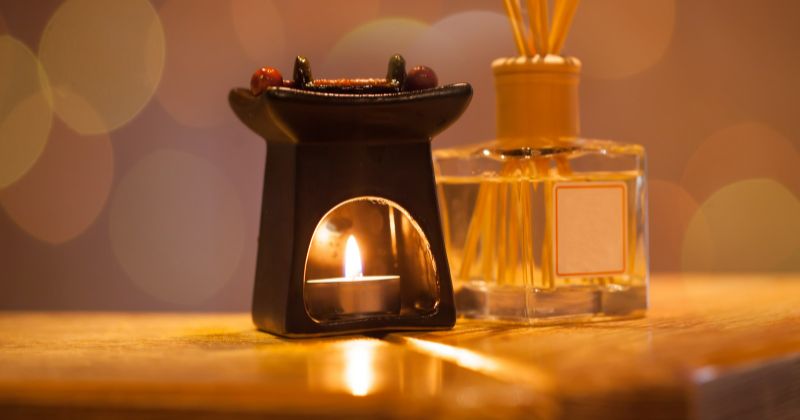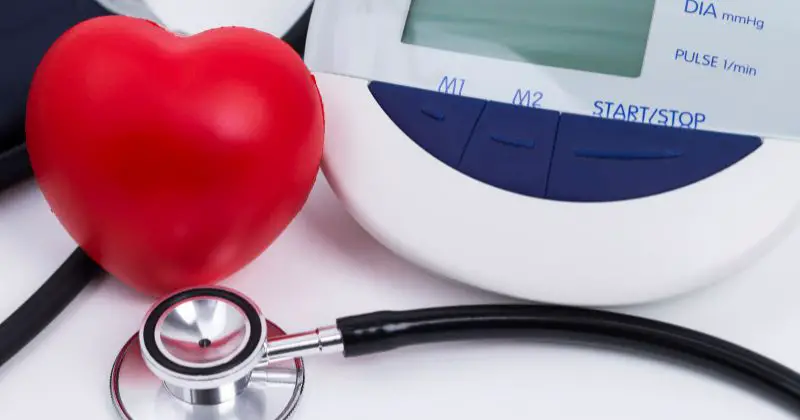In today’s world, high blood pressure is a prevalent problem. According to the American Heart Association, high blood pressure affects over half of all adults in the United States. Fortunately, you may lower blood pressure with aromatherapy and keep it at a healthy range by implementing interventions and lifestyle changes.

How do you do that? The answer is aromatherapy. What? Can you do that? If yes, then ‘How to lower blood pressure with aromatherapy?’ is your next question. Well, read on to find out how you can do that.
What is Aromatherapy?
Aromatherapy is a holistic healing approach that promotes health and well-being by using natural plant extracts. ‘Essential oil treatment’ is another name for it. It promotes body, mind, and soul health by using fragrant essential oils. It benefits both physical and emotional health.
Aromatherapy is regarded as both a science and an art. It has recently gained popularity in the domains of science and medicine.
Is Aromatherapy New?
For thousands of years, humans have used aromatherapy. People in ancient China, India, Egypt, and other societies used aromatic plant components. They employed these natural substances for religious and medical purposes. They were thought to have physical as well as psychological advantages.
The Persians are credited with the invention of essential oil distillation in the 10th century. However, the practice may have existed for much longer. 16th century Germany witnessed the publication of information on essential oil distillation. French physicians in the nineteenth century recognized that essential oils as having therapeutic value.

How Does Aromatherapy Work?
Experts believe that aromatherapy stimulates your nose’s smell receptors, which convey signals to your brain via your neural system.
Certain parts of your brain, such as the limbic system, which is involved in emotion processing, may be stimulated by the oils. Your hypothalamus may also respond to the oil by producing feel-good brain chemicals like serotonin.
When you apply essential oils to your skin, some experts believe they trigger reactions in your skin and other regions of your body, such as your joints.
Since you have become familiar with some basic concepts now, it is better we go a little more into our quest to find out how aromatherapy can lower blood pressure. You have come across the term “essential oil” and now are wondering what they are. Well, to begin with, they are also known as aromatherapy oils. So, let us get going.
What Are Essential Oils or Aromatherapy Oils?
If you’ve ever had the pleasure of smelling a rose, you’ve experienced the aromatic properties of essential oils. The seeds, bark, stems, roots, flowers, and other portions of plants contain these naturally occurring, volatile aromatic substances.
For example, essential oils are responsible for a plant’s particular scent, as well as its protection and pollination.
Essential oils have long been utilized for food preparation, cosmetic treatment, and health-care procedures, such as decreasing high blood pressure, in addition to their intrinsic advantages to plants.
For more than 5,000 years, people across the globe have relied on plant essential oils to treat a wide range of ailments. Relaxation, personal care, and household maintenance are just a few of the many uses for these versatile essential oils, but they are most frequently employed as a natural remedy. High blood pressure can be treated with essential oils.
Here is an informative video focusing on lowering blood pressure with aromatherapy:
How Do You Use Essential Oils?
Essential oils can be applied to the skin, massaged, inhaled, or utilized as an airborne infuser.
They can be used alone or in combination. Some proponents recommend combining multiple herbs in order to increase their potency.
So, now you know that essential oils constitute an important element of aromatherapy for treating high blood pressure. Really? We have not discussed that yet, but we are going to after we deal with one basic question, “Do essential oils/aromatherapy oils treat high blood pressure?” Let’s find out.
Do Essential Oils Treat High Blood Pressure?
70 million Americans have high blood pressure; we need to find safe methods of lowering blood pressure without causing any negative reactions. A wide range of potential risk factors has been identified as being responsible for elevated blood pressure. An unhealthy diet, a sedentary lifestyle, and emotional stress all have a role in the development of high blood pressure.
It is possible to be administered medication to lower your blood pressure if you’ve been diagnosed with high blood pressure. Natural essential oils, on the other hand, have been demonstrated to have a favorable influence on blood pressure in a few studies.
Wait, What? That means there is scientific evidence that aromatherapy can treat high blood pressure. Yes, it can, and remember, essential oils are an essential part of aromatherapy. So, what essential oils can you use as part of the aromatherapy to lower your blood pressure?
Here Are the Essential Oils To Help You Lower Blood Pressure:
Jasmine Oil:
There is a sense of peace and tranquility that comes from using jasmine essential oil. For anxiety, tension, rage, and sadness, as well as inflammations of all kinds that affect mood and pain throughout the body, it is a good choice. In order to lower blood pressure, it helps to calm the body by eliminating these conditions.
Geranium Oil:
Geranium has a number of beneficial effects on the body, including increased circulation, detoxification, improved digestion, emotional harmony, and a more pleasant night’s sleep. One of the most efficient ways to relax an overactive mind is to use geranium. Geranium has a calming impact on those suffering from stress and anxiety, making it ideal to use before night.
Lavender Oil:
Lavender oil has a wide range of medicinal applications, making it an excellent general healer. In a recent study, EEG machines were used to measure the brain impulses of patients before and after they inhaled lavender essential oil. The study found that lavender essential oil has a number of health benefits, including lowering heart rate and blood pressure and enhancing the brain’s ability to relax.
Marjoram Oil:
Sweet marjoram essential oil, despite its relative lack of fame, is nevertheless a potent ingredient. Heart failure can be prevented by reducing myocardial oxidative stress, which can be reduced by the use of this essential oil. This could help prevent a heart attack. Although this essential oil is less well-known, it has been used in traditional Moroccan medicine for many years to alleviate hypertension.
Rose Oil:
You can use rose essential oil to treat a wide range of hormonal and mental problems. It has a powerful potential to improve blood flow, which makes it very useful in decreasing blood pressure.
Lemon Oil:
Lemon balm essential oil is also a heart tonic, which lowers blood pressure. A heart attack, tachycardia, and palpitations are all prevented by this essential oil. It improves mood and restores emotional equilibrium with its powerful antidepressant qualities.
Valerian Oil Root:
The use of Valerian essential oil can help with treating stress, anxiety, and heart palpitations. As a nighttime sleep aid, this may be the most effective oil to use. It is well-known that the essential oil of valerian has soothing properties. To help the body rest and relax, it releases tensed sympathetic nerves while simultaneously boosting the parasympathetic nervous system.
Frankincense Oil:
Frankincense has been used for centuries to alleviate stress and enhance mental focus. Ancient Egyptians used it as a way to bring about a state of calm and tranquillity. Essential oil frankincense has a relaxing impact on the body and mind. Additionally, it helps regulate the heart’s rhythm.
Bergamot Oil:
Using bergamot essential oil in a diffuser and inhaling it for 15-60 minutes helps lower high blood pressure. Bergamot essential oil has been shown to significantly lower blood pressure and heart rate in persons who use it as an aromatherapy oil.
Ylang Ylang Oil:
Ylang ylang essential oil and bergamot essential oils have also been found to lower blood pressure and cortisol levels when inhaled together. Patients with hypertension can benefit from the usage of these oils.
Neroli Oil:
It’s an essential oil made from the bitter orange tree’s blossoms (Citrus aurantium). It has a sweet, honeyed, metallic aroma with green and spicy undertones. It’s widely used in perfumes, although it’s only utilized in small amounts in the flavoring sector.
Neroli essential oil is useful for treating insomnia and depression, as well as for lowering blood pressure when combined with lavender, marjoram, and ylang ylang.
Sage Oil:
Clary Sage essential oil has been shown to reduce stress and anxiety, which can lead to an increase in blood pressure. This oil has been shown to reduce blood pressure by 4.7% and 5.1%, respectively, in people who inhale it for 60 minutes.
Conclusion:
Yes, aromatherapy can help lower blood pressure. The use of essential oils helps you exactly do that. There appears to be a long and impressive list of essential oils that can help decrease blood pressure. Now please keep in mind not to ingest these essential oils by mouth. You can only use these as inhalation, a massage, or an infusion into the air. When it comes to buying quality essential oils, your first choice should be reputable dealers.
